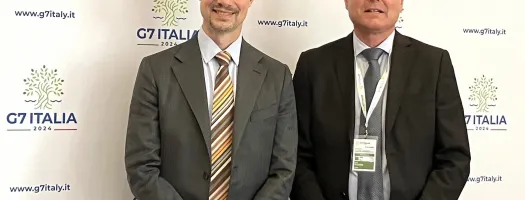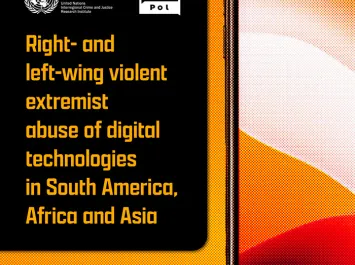UNICRI’s Acting Director, Leif Villadsen, addressed leaders at the first G7 Rome-Lyon Group Heads of Delegation Meeting on 18 April and proposed solutions to tackle the threat of increasing crime in the two vital areas of synthetic drug trafficking and the use of emerging technologies for crime and exploitation.
The meeting, hosted by Italy’s Ministry of Foreign Affairs and International Cooperation, was the first under the Italian Presidency.
Mr. Villadsen warned about the increasing links between drug trafficking, organized crime, and terrorism, particularly captagon. He also cautioned that despite the advantages offered by emerging technology, its rapid uptake may threaten public safety, human rights, and digital inclusivity if not used responsibly.
Tackling increasing links between drug trafficking, organized crime and terrorism
“Synthetic drugs represent a growing threat as they are cheap and easy to manufacture anywhere in the world,” he said.
Mr. Villadsen added that synthetic drugs offer criminals several advantages, such as lower operational costs, fewer production impediments, and reduced risk of detection as chemicals used in the production may fall outside of existing controls, there is no fixed geography and production times are much shorter. As a result, captagon is trafficked with increasingly sophisticated methods such as simultaneous operations at different spots of the border to distract guards, the use of drones to drop shipments and the exploitation of tunnels.
To counter the production and trafficking of captagon, UNICRI proposed a three-pronged approach.
- Engaging both producing and destination countries. As the production of captagon tablets can occur in different geographical areas, increased efforts should be put forward to detect and counter the illegal production and diversion of precursors and stimulants, in addition to tableting operations.
- Developing coordinated responses at national and regional levels with the involvement of law enforcement agencies, analysts and relevant stakeholders in the framework of inter-agency cooperation.
- Enhancing systematic data and information sharing as, despite several interceptions of illicit drug shipments, reliable data on their seizure and demand in destination markets remain limited.
“We are facing a complex challenge that intersects a broad variety of factors, including cross-border criminality, regional instability, socio-economic development, and human rights violations,” he said. He emphasized that improved knowledge and strong partnerships at the local, national, regional, and international levels are key to tackling these illegitimate networks and stopping their harmful effects.
Promoting the responsible use of emerging technologies, including Artificial Intelligence, to address crime and exploitation Mr. Villadsen noted that the role of new and emerging technologies as disruptors, enablers, and tools of crime is transforming the criminal justice landscape, as criminals can leverage these technologies for tracking, profiling, and accessing targets and victims with frightening efficiency.
However, the same technologies offer powerful solutions as new and emerging technologies have also encouraged innovations in crime prevention, detection, and control. Artificial intelligence (AI) tools and even large language models (LLMs) can be applied to detect and combat crimes related to illicit financial flows, online child sexual exploitation and counterfeit goods, among other crimes, while facial recognition technology has also been adapted to support law enforcement investigations for identification and authentication.
To this end, through various initiatives, UNICRI has undertaken significant efforts to understand and combat cybercrime and cyberterrorism and to promote the responsible use of AI and other emerging technologies to address crime and exploitation.
“As we navigate this dynamic landscape, UNICRI remains committed to ensuring that technological advancements in criminal justice serve to enhance, not hinder, our collective efforts to uphold justice and human rights. Our focus is to balance innovation with integrity, ensuring that the tools we deploy in our fight against crime are used wisely and ethically,” Mr. Villadsen concluded.



